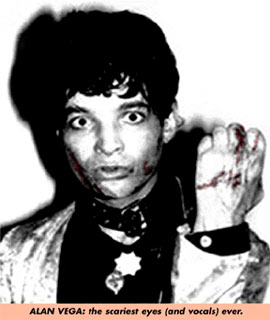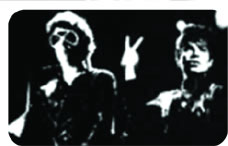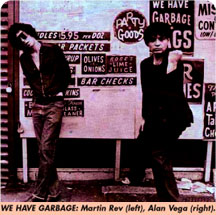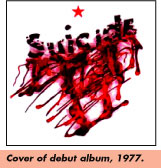|
"Can we, as a country, all
agree
|
|
xmag.com
: July 2003: Suicide
|
MY
LITTLE PINK EARS were pressed right up against
mom's vacuum cleaner as it sat hummmmmmmming
on the carpet. I was three or four years old,
and I don't think I'd ever heard such a beautiful
sound before. The closer I got to the machine's
whirring motor, the more at peace I felt. I nestled
inside a warm, invisible marsupial pouch of white
noise, a sonic electric blanket which covered
and protected me. Since then I've always found
comfort in the monochrome drone of machines: Electric
drills, fans, air conditioners, and blenders can
all put me in touch with the universe's vibratory
OM, the sound of God yawning.
MY
SWEATY TEENAGED EARS were pressed right up
against mom's transistor radio in the kitchen,
perplexed by the hummmmmmmming sound that
softly sprayed from the tiny speaker. It was 3AM
on New Year's Day--only three hours into the 1980s--and
the college-radio DJ had announced that this was
the song his Philly-punk listeners had chosen
to usher in the new decade. You call this a song?
It sounds like a vacuum cleaner with some nervous,
jail-punky guy saying the word "Frankie" over
and over again.
And
then came the screams. 
Frankie
picked up the gun...pointed it at the six-month
old kid in the crib....
Frankie
looked at his wife...shot her....
Frankie
put the gun to his head...
AAAAAAGGGGHHHHHHH!!!!!!!!
Frankie's
lyin' in hell...
AAAGGGGGGHHHHHHHHHHHH!!!!!!
It
probably didn't help that I was high on acid.
These
were the most terrifying screams I'd ever heard,
a sinister counterpoint to the drone's seductive
lure. I didn't catch the name of the song or the
artist, and I wasn't sure I wanted to know.
About
six months later...just a drop in eternity's bucket...a
friend picked up a bargain-bin LP by a band called
Suicide. The album cover featured the word "suicide"
imposed over deep, violent, bloody laceration
marks...wrist slashes, maybe? When I asked him
what the record sounded like, he just laughed
and said, "It's PSYCHOTIC. You'll like it."
Although
barely a half-hour long, Suicide's debut album
from 1977 bears something of the eternal. A masterpiece
of microdot minimalism, it is also unbearably
vast--just like the eternal hum that extends from
inside my head out to the furthest quasars. There
are only two members listed on the album--Alan
Vega ("Vocal") and Martin Rev ("Instrument").
There are only seven tracks--not "songs"--each
with the same primitive hissing, droning, Wurlitzer-organ-sounding
beatbox pumping along like a psycho killer's heartbeat.
There are no bridges or tempo changes. Each track
takes a simple keyboard riff--the most complicated
track has a riff of only FIVE NOTES, while most
are only two or three notes--and pounds away at
it with meat-grinder precision. The riffs go around
and around and around and around with the heartless
two-tone persistence of a spiraling hypno-wheel.
There are very few lyrics, and they are chanted
rather than sung. Even the song titles ("Che,"
"Girl," etc.) are minimal.
And
it's the greatest album ever made. At least I've
listened to it more than any other album. When my father was
dying of cancer, I used to force myself to listen
to it just to face the fear head-on. It's the
only music I've ever heard which is so dark and
malignant that it might actually be able to give
you cancer.
more than any other album. When my father was
dying of cancer, I used to force myself to listen
to it just to face the fear head-on. It's the
only music I've ever heard which is so dark and
malignant that it might actually be able to give
you cancer.
In
the album's center, clocking in at ten and a half
carcinogenic minutes, is the unsettling track
I heard on New Year's Day--"Frankie Teardrop."
It still scares me. It's the only song I won't
play loud in my apartment because the screams
are so real, I'm afraid someone will call the
cops. It's my "Freebird," "Stairway to Heaven"
and "The End" all wrapped up in one.
Suicide's
immediate forefathers were noise-art weirdbones
such as John Cage and LaMonte "White Man with
a Black Name" Young, the latter of whom formed
a "theater of eternal music" called the Dream
Syndicate in the early 1960s. LaMonte Young once
proposed a project where rotating musicians would
play the same note forever. A violinist named
John Cale (different guy from John Cage) studied
with Young and later joined The Velvet Underground,
who did their own noodling with drone potential
on songs such as the seventeen-minute "Sister
Ray." But that band featured Lou Reed, who's a
douche.
If
you listen closely enough, you'll realize how
much music depends on The Big Drone...on beats
endlessly repeated or on notes held for what seems
an unjustly long time. It's there in Gregorian
chants and Scottish bagpipe music and Indian ragas.
It puls
es
through disco and house music and trance. Donna
Summer's "I Feel Love," a song almost as mighty
as the best of Suicide, droned its way to #1
in 1977 while "Frankie Teardop" languished in
the shadows.
ALAN
VEGA, THE MAN WITH THE SCARIEST EYES and
 voice ever, the man who looks like Poncherello
from TV show CHiPS if Ponch were an effeminate
psychotic speed freak, claims to have coined
the musical term "punk" back in 1971 on a flyer
for a Suicide show advertising "a punk music
mass." Vega and Martin Rev were near-homeless
and hungry when they met each other and named
their group after a comic book called Satan
Suicide. I've heard tales of Suicide playing
a twin bill with the New York Dolls at the Mercer
Arts Center--both groups performing simultaneously
in separate rooms. After a minute or two of
ogling crazy Vega swinging a chain around, smashing
himself in the face with his mic, and screaming
bloody murder, everyone had left the Suicide
room to go watch the much-safer Dolls.
voice ever, the man who looks like Poncherello
from TV show CHiPS if Ponch were an effeminate
psychotic speed freak, claims to have coined
the musical term "punk" back in 1971 on a flyer
for a Suicide show advertising "a punk music
mass." Vega and Martin Rev were near-homeless
and hungry when they met each other and named
their group after a comic book called Satan
Suicide. I've heard tales of Suicide playing
a twin bill with the New York Dolls at the Mercer
Arts Center--both groups performing simultaneously
in separate rooms. After a minute or two of
ogling crazy Vega swinging a chain around, smashing
himself in the face with his mic, and screaming
bloody murder, everyone had left the Suicide
room to go watch the much-safer Dolls.
Suicide
tended to get lost in the late-70s NY punk-rock
shuffle. Since they sounded like nobody else,
offered no release from the blackness, and were
so minimal as to be insulting, their live performances
were often greeted with hostility and violence.
A 1978 performance in Belgium, captured on the
live track "23 Minutes Over Brussels," erupted
in a riot where audience members stole Alan
Vega's microphone.
Lost
even within a world of misfits, Suicide were
eventually adopted by spindly, supermodel-marrying
Ric Ocasek of The Cars. A huge fan of the group,
Ocasek wound up overproducing Suicide's second
album in 1980. He also produced their biggest-selling
song, "Dream Baby Dream," before Alan Vega split
off for a mostly unsuccessful Scary Elvis solo
career. Although well past middle age, Suicide
recently reformed and cut a newer, softer, dance-floor-friendly
album which I could only bear for about twenty
seconds before getting too depressed and playing
"Frankie Teadrop" again. Alan Vega is now married
and has a kid, but unlike Frankie, it's reasonably
certain he won't kill it.
Mute
Records recently re-released the highly disposable
second  Suicide
album (like the first, it's called Suicide)
in a two-CD package with The First Rehearsal
Tapes, featuring fourteen spooky tracks
from 1975. You can use the second album as a
cocktail coaster, but I insist you buy the package
on the strength of The First Rehearsal Tapes.
Echoey and muddled, ancient and futuristic,
they are even more disquieting than the first
Suicide album. Rev plays circus music from hell
over rattlesnake-tail beats while Vega sounds
gakked out of his mind on meth, hissing and
threatening, trapped inside a tin can and enduring
torments from which I always feel compelled
to rescue him. Suicide
album (like the first, it's called Suicide)
in a two-CD package with The First Rehearsal
Tapes, featuring fourteen spooky tracks
from 1975. You can use the second album as a
cocktail coaster, but I insist you buy the package
on the strength of The First Rehearsal Tapes.
Echoey and muddled, ancient and futuristic,
they are even more disquieting than the first
Suicide album. Rev plays circus music from hell
over rattlesnake-tail beats while Vega sounds
gakked out of his mind on meth, hissing and
threatening, trapped inside a tin can and enduring
torments from which I always feel compelled
to rescue him.
Most
of punk rock, for all its pretense about being
"revolutionary," was just an amped-up juvenile-delinquent
50s nostalgia act, hence the leather jackets,
"rebel" pose, and two-minute songs. We're in
the 21st century now, and guitars are as passé
as violins. Today's young'uns don't listen to
guitar music, they listen to hip-hop, which
usually consists of one vocalist and one guy
manning the machines... just like Suicide.
Like
the eternal droning hum of the big black universe
which kills us all, their sound both comforts
and frightens me. And I couldn't stop listening
even if I tried.

|
|
|
| ©
2003 X Publishing, Inc. All rights reserved. copyright | trademark | legal notices |
|





